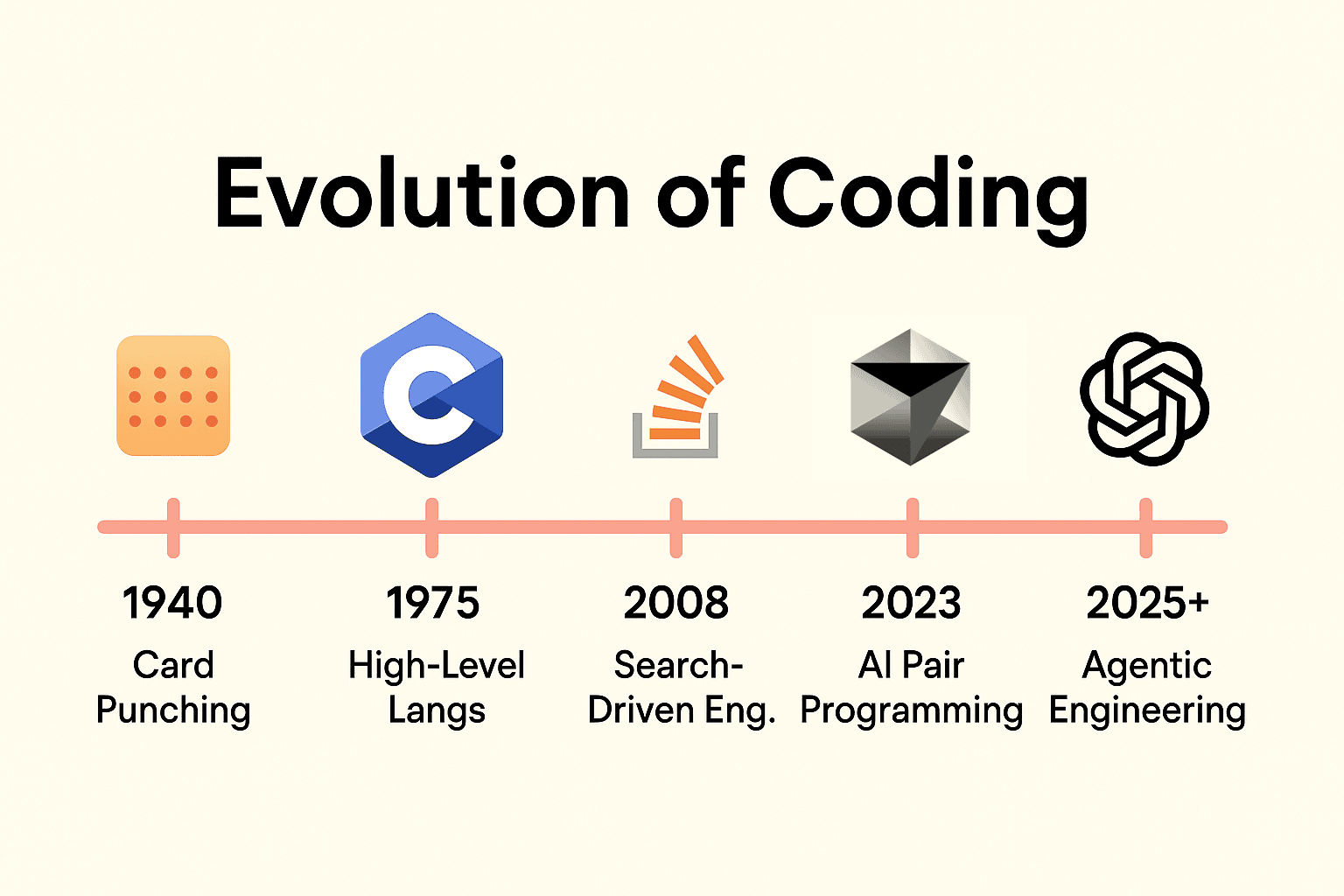
Writing software has evolved multiple times since its creation. It evolved again - twice!
| Card Punching | 1940 – 1975 | Machine code on punched cards. |
| High-Level Languages | 1975 – 2007 | High-level languages (C, Python, JS) abstracted away hardware and democratized programming. |
| Search-Driven Engineering | 2008 – 2020 | Stack Overflow + Google shift the craft to copy-modify-ship; answers trump memorisation. |
| AI Pair Programming | 2023 – 2025 | AI IDEs like GitHub Copilot, Cursor autocompletes whole blocks; engineers review instead of write. |
| Agentic Engineering | 2025 – present | Cloud agents like Codex and Devin turns sync workflow to async workflow. Devs orchestrate and review. |
- Programmers wrote their code on paper
- A programmer used a keypunch machine to punch holes into paper cards
- You fed the deck of cards to a computer center where an operator loaded the cards into the mainframe
- Each card was read by the machine and results were printed on a paper or new cards.
- Programmers transitioned from machine code to languages like C, Python, JS
- Code was written in a more human-readable syntax. Had less need to understand hardware specifics.
- Compilers translated high-level code into machine code for execution
- Debugging involved interpreting error messages and using debuggers to step through code
- Programmers searched for solutions on Stack Overflow, Google, and forums
- Coding involved copy-pasting, adapting, and integrating code snippets from the web
- Debugging often meant searching error messages and finding fixes online
- Documentation and Q&A sites became the primary learning resources
- The skill shifted from memorizing syntax to quickly finding and evaluating code examples
- Programmers use AI-powered tools (like GitHub Copilot, Cursor) that suggest or write code in real time
- Coding shifts from writing lines to prompting, reviewing, editing with the help of AI.
- Engineers write only 10–20% of the code, whereas AI writes the majority of the code.
- Debugging often involves prompting the AI for fixes or explanations
- Collaboration with AI becomes a core part of the workflow
- Engineers orchestrate multiple AI agents or cloud-based tools to work on tasks in parallel
- Programming becomes more about managing, delegating, and reviewing work done by autonomous agents
- Tasks like refactoring, testing, and opening pull requests can be automated and run asynchronously
- The developer's role shifts to project management and quality assurance of agent outputs
- Engineers often don’t write code — they review and manage outputs from agents.
So much change in so little time
Software is probably the fastest evolving industry in the world. Frontend engineers already relearn a new JS framework every 5 years.
With the newest innovations, our industry is not just moving fast, it’s having decades worth of evolution in months to years timeframe.
This pace forces engineers to relearn their job so quickly that most go through the five stages of grief - denial, anger, bargaining, depression, and acceptance.
Senior Engineers are in denial
Senior engineers will have a harder time for a few reasons
- No one would use AI if it was worse than them. Senior Engineers are better so AI getting to their level takes longer.
- AI is already better than majority of the developers. However, this is still sandbox environment. For AI in practice to be better than Senior Engineers, engineers need to spend time to learn new workflows, ways to make AI work for them. I call this “activation energy” to learn the new workflow. From my personal experience a junior might spend 2 weeks of activation energy and it’s already better, but a senior takes around 4 to 6 weeks until they figure out how to make an AI assisted workflow to be better than the current workflow they have.
Junior Engineers have the upper hand
Junior Engineers for the first time in history have advantage over Senior Engineers.
- They are worse developers, making the activation energy needed to make AI better than them being significantly less than a senior.
- Being young and having high energy allows them to spend more time and evolve.
Asking senior engineers to spend 4 to 6 weeks is way too much for majority of them, but here’s the truth: the tools level the playing field. Senior engineers who adapt will outperform everyone. Those who don’t may find junior developers outrunning them — not in knowledge, but in raw output
Seniors being in denial and juniors adopting to the evolution in our industry is resulting in a young 23 year old taking a lot of 1-2 hour tasks and deliver 20 of them in a single day surpassing seniors in certain ways.
I foresee this trend to continue for 5 years until mass market adopts the major evolutions that’s happening in the industry.
If you haven’t evolved with the industry yet, maybe it’s time to reconsider to spend the activation energy required to learn the new workflows. Just note that everything might change again in the next year.
.png)



